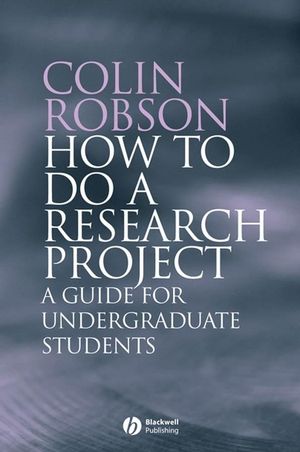|
Textbook
How to do a Research Project: A Guide for Undergraduate StudentsISBN: 978-1-4051-1489-9
Hardcover
176 pages
January 2007, ©2007, Wiley-Blackwell
 This is a Print-on-Demand title. It will be printed specifically to fill your order. Please allow an additional 10-15 days delivery time. The book is not returnable.
|
||||||
"As someone responsible for an honours thesis seminar in
anthropology, where undergraduates are to undertake their own
research projects, I found this newest contribution by Colin Robson
to be of substantial value and special merit. Robson is keenly
aware of the many difficulties encountered by students in making
the transition from consumers to producers of knowledge. This work
draws in readers with illuminating guidelines and it educates even
those with an advanced knowledge in research methods. As usual,
Robson is able to synthesize and present knowledge distilled not
just from personal experience but also from his coverage of the
vast methods literature. He does so in a manner that, far from
overwhelming students, furnishes students with an invitation to
undertake exciting projects in social research that will surely
leave them with a lasting impression."
–Dr Maximilian Forte, Department of Sociology and
Anthropology, Concordia University
"Colin Robson has produced a practical guide for undergraduates
conducting research projects. The text is clear and accessible and
includes material on planning, conducting and writing-up projects.
It will be a valuable guide for beginners."
–Bob Burgess, University of Leicester
"Having just graduated, I wish this book had been available when
I was pursuing my undergraduate degree. Research projects can be
very daunting for undergraduate students when they are let loose on
a project of their own in the third year. This book provides some
handholding during these times with its very clear and logical
structure... This book’s main purpose is to aid final-year
undergraduate students, but it would also benefit levels one and
two as it explains the basics of conducting research projects and
general information, such as ethics and plagiarism in a clear and
accessible way... This book levels the playing field of information
so that all students have the same basis for their projects, e.g.,
a clear understanding of design and research types... Lecturers
could use this book as a primer to save time explaining the basics,
thereby allowing more time for expert guidance... How to Do a
Research Project brings clarity, simplicity, and brevity to the
methodology behind research projects. I suggest that
higher-education institutions recommend this accessible and
practical book to students as prerequisite reading where
applicable."
–Tamsin Shaw, University of Leeds (in
'Qualitative Research In Psychology')
"How to Do a Research Project...is a highly readable,
engaging guide that provides the necessary technical detail minus
the dryness. ... This volume...represents a comprehensive yet
concise primer for anyone contemplating undertaking research. It is
also a constructive resource for instructors and supervisors of
student research. ... Drawing on his lengthy career in research and
teaching, Robson interjects the mundane realities, potential
pitfalls, and other considerations likely to arise during the
research process. ... After reading the text in its entirety,
students will find these handy reference tools [text boxes] useful
to return to when conducting a live research project. ...
Included also is a valuable section on searching, reviewing, and
summarizing the literature that will be useful for students. ...for
the novice or tentative researcher Robson's commonsense style of
writing conveys an intuitive grasp of the process that brings the
reader into the "feel" of the project, breaking the research
process down into logical, manageable stages, which is empowering
and encouraging, rather than presenting the process as a daunting
one that can dissuade students. ... At a cost of $24.95 (US/Cdn)
this book is accessible to students and it is not just
another dry, dull research methods textbook."
–Lynn Eldershaw, PhD, International Institute for
Qualitative Methodology, University of Alberta (in
International Journal of Qualitative Methods 6 (2) June
2007)



